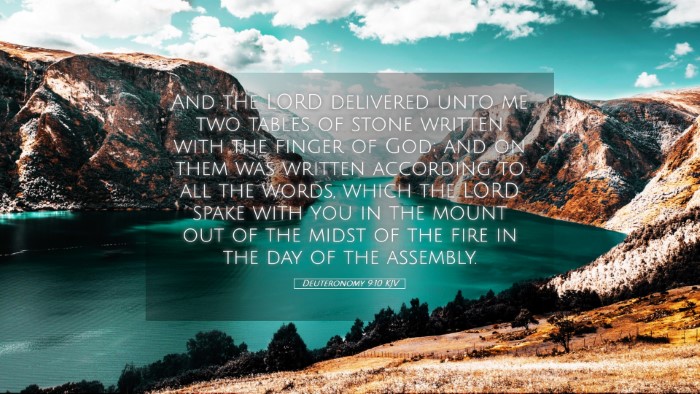Commentary on Deuteronomy 9:10
Verse: "And the LORD delivered unto me two tables of stone written with the finger of God; and on them was written according to all the words, which the LORD spake with you in the mount out of the midst of the fire in the day of the assembly."
Introduction
This verse encapsulates a pivotal moment in Israel's history, emphasizing the divine origin of the Law. The significance of the tablets of stone cannot be overstated, as they represent not only God's covenant with His people but also His direct communication and command. The commentaries by Matthew Henry, Albert Barnes, and Adam Clarke provide profound insights that illuminate the depth of this passage.
Divine Authorship of the Law
Matthew Henry notes the significance of the phrase "written with the finger of God," highlighting that the Law's authority transcends human perception, being rooted in divine will. This underscores the notion that the commandments were not mere human suggestions but divine edicts, revealing God's character and intentions for Israel.
Albert Barnes elaborates on this theme by asserting that the tablets were a direct gift from God, representing His personal involvement in the creation of the Law. This points to the intimate relationship God desires with His people and sets a precedent for understanding the weight and seriousness of the commandments. The implication here is that recognizing the Law as a divine gift can lead to a deeper reverence and obedience among the faithful.
The Writing of the Law
Adam Clarke adds an important dimension by examining the contents of the Law as "all the words." This reflects the inclusivity of the commandments, which not only govern moral conduct but also encompass various aspects of worship and social order. Clarke emphasizes that the totality of God's Law is essential for guiding the life of the believer, thereby underscoring the Law's comprehensive nature.
The Context of Revelation
The phrase "spake with you in the mount out of the midst of the fire" places the giving of the Law in a dramatic context, characteristic of divine revelation. Henry points out that such an atmosphere is indicative of God's majesty and holiness. The fire represents both judgment and purification, serving as a reminder that those receiving the Law are standing in the presence of a holy God.
Barnes also reflects on the communal aspect of this revelation. The reference to "the day of the assembly" indicates that this was not merely an individual encounter but a collective experience for the nation of Israel. This communal aspect reinforces the idea that the Law was given to guide the entire community, a teaching moment that shapes collective identity and responsibility.
Theological Implications
This verse invites reflection on three profound theological implications:
- The Nature of God: The giving of the Law demonstrates God’s desire to communicate with humanity. He is not distant but passionately involved in guiding His creation.
- Covenantal Relationship: The tablets symbolize the covenant between God and Israel. This relationship is characterized by commitment and expectations, informing the ethical framework through which believers are called to live.
- The Call to Obedience: Knowing the divine origin of the Law should provoke a response of obedience from the people. The recognition of the Law as God’s direct command promotes a lifestyle that honors His will.
Application for Today
In a contemporary context, Deuteronomy 9:10 calls for reflection on how we view God's commandments in our lives. Are they seen as burdens, or do we recognize them for what they are: a loving guideline from our Creator? Henry reminds us that obedience is rooted in love and gratitude towards God, challenges that every believer must navigate in their faith journey.
Barnes encourages us to maintain a reverent attitude towards God's Word, as it is the foundation on which our lives should be built. Modern believers are called to engage with Scripture authentically, seeking to understand and apply its teachings in a way that reflects both reverence and relational intimacy with God.
Clarke's emphasis on the community aspect of the Law invites us to consider our responsibilities toward one another. The commandments were given to shape the societal norms within Israel, implying that community life should be steeped in mutual respect and adherence to God's directives. This is a profound challenge for the church today, as communal ethics rooted in divine law can transform fellowship and witness.
Conclusion
Deuteronomy 9:10 serves as a foundational text for understanding the character of God's commands, their divine origin, and their purpose for the Israelite community—and, by extension, for believers today. As we reflect on this verse, may we seek a deeper understanding of God's heart and a greater commitment to living in obedience to His revealed will. The insights from Matthew Henry, Albert Barnes, and Adam Clarke help us to understand not just the historical context of the Law, but its enduring relevance in our spiritual lives.


